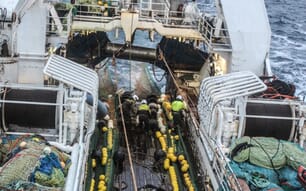Article 4 of the regulation establishes measures for the protection of essential habitats for fishing, such as coralligenous and marl beds, measures which have not been yet been applied by Spain after six years of the entry into force of the Community regulations.
We have cross-referenced many studies on the presence of protected habitats in the Mediterranean with fishing areas where harmful fishing gears are being used. In south Majorca, we have enough information to file a claim with the EU for breach of article 4 of the Mediterranean Regulations, which have been in force for six years now, says Xavier Pastor, Executive Director of Oceana in Europe.
Some cases are so evident and shameful that they should be immediately punishable, such as trawling in marl beds in the Migjorn reservation or the devastation of the unique coralligenous beds in Fort den Moreu, to the east of the Cabrera National Park.
The importance of coralligenous and marl beds lies in the fact that they are tri-dimensional formations of calcareous red algae that shelter hundreds of species, many of them fishing species, which make use of them to hide, spawn, and find food. Despite their environmental significance and the fact that they are protected habitats, they are being devastated by fishing gears banned by European regulations in this kind of seabed.
For years, a lack of maps has provided the perfect excuse not to fulfil obligations, but now we have sufficient data to apply the Regulation and immediately declare the establishment of protected areas, adds Pastor. Moreover, fishermen know that they are fishing on forbidden coralligenous or marl beds, because pieces of these organisms come up, caught in the fishing nets.
Oceana to Send Evidence of Illegal Fishing in Cabrera to the EU
SPAIN and EU - Oceana will send to the EU evidence found of illegal fishing activity in the area surrounding Cabrera and south Majorca, filing a claim against Spain for breach of the Council Regulation (EC) No. 1967/2006 for management of fishery resources in the Mediterranean Sea.
by Lucy Towers



